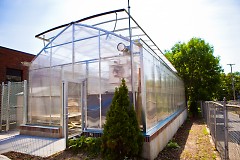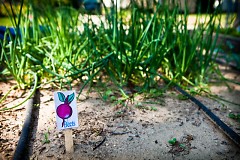A recent Kent County Health Department food security assessment revealed that the Baxter neighborhood qualifies as a food desert. Though “food desert” might evoke Lawrence of Arabia-esque imagery of a lone figure traversing an ocean of sand under a punishing sun, searching for the provisions necessary to sustain life, the term actually refers to any area where you can’t buy affordable fresh produce within walking distance of your home. For Baxter residents the closest grocery stores with year-round healthy, inexpensive produce are Meijer (28th St and Kalamazoo) and Family Fare (1415 Fulton Street East).
When Baxter Community Center (BCC) staffers heard about the Kent County health report it corresponded with nutrition-related health problems they were observing in Baxter residents coming to the Wholistic Health Clinic.
“Often, there are a lot of barriers to a trip to the grocery store--transportation, childcare, and so on--so for many families it's a lot easier to shop at convenience stores close by, where the variety of healthfulness of foods is often limited,” said Danielle Veldman, the Greenhouse Program Coordinator at BCC. Since a big part of Baxter’s mission is to meet the basic needs of the surrounding community while also looking for ways to assist people in becoming self-sufficient, they decided to be proactive in crafting a long-term solution to the food and health issues in this area of the city.
A little over three years ago, the idea for a greenhouse was born. Fundraising for the project was included in the Baxter 40th anniversary initiative with construction wrapping up in November 2011. For the project, Veldman researched Milwaukee's Growing Power, greenhouses and community gardening programs such as Earthworks in Detroit, and other programs across the country to come up with a program that would be feasible for Baxter.
“Community health and family mealtime and good food in general has been a very personal passion of mine,” says Veldman. To help oversee the project, she put together an agricultural committee consisting of two farmers, a canning expert, two urban food advocates, the Baxter facilities manager and a Baxter executive board member. “We all meet together once a month and brainstorm around outreach, growing practices, and programming- and they’ve been really great about helping Baxter get connected to the Grand Rapids growing community [as well as] introducing us to a lot of the key people we need to know.”
Currently, there are the two different programs that are run out of the greenhouse: “Around the Table” and “In the Garden.” “Around the Table” began as pilot program several years ago to promote regular family meal times and nutrition education, and has since expanded to include cooking classes and a twelve-week canning course. The first course was implemented last fall and will continue each year to teach Baxter residents affordable and tasty ways to preserve the harvest.
“Last year we had 12 women go through it and they stayed for all 12 weeks and they loved it and it was so much fun! They learned a ton; I learned a ton,” says Veldman.
The canning class highlights nutrition, healthy foods and economical ways to preserve produce so people won’t need to buy it at the store during the winter months. After the class was over one of the participants approached Veldman and told her that before the class she never would have tried zucchini. Even though she saw it in the store, she always passed it by because she didn’t know what to do with it. But now it’s one of her favorite vegetables and she eats it all the time.
“Zucchini wasn't even part of the main class-- we put a couple of zucchini slices in this tomato based mix we were making and everyone got to taste it. That was enough to just make something not scary and introduce her to something new and now she loves it! And she’s transferred that into trying all sorts of new stuff so that was cool,” Veldman adds.
Baxter parents are not the only ones learning to try unfamiliar foods. In addition to the fall classes, BCC offers one-day canning workshops in the summer for adults and families. Baxter also offers youth volunteer days and kid's gardening programs as a Healthy Living Hub with the YMCA. As a result, their kids are learning to branch out too.
“That’s the thing I’ve noticed. If kids are picky eaters and they don’t like something, wait until they grow it themselves and then they get excited and maybe they still won’t like it when they try it, but they will be a lot more willing to try it than they were before,” says Veldman.
The “In the Garden” program offers gardening classes for children and adults. “Dig It” is the children’s gardening club that meets every Thursday from 4:00 p.m. to 6:00 p.m., where the children can do activities, eat healthy snacks, learn about how plants grow and a little bit of the science behind it. For adults there are workshops once or twice a month taught by volunteer master gardeners. The adult classes cover everything from introductory level gardening to more advanced lessons like season extension and seed saving.
“So far we’ve had really good attendance. Anywhere from six to 14 people show up at any given class. We started with Garden Planning in March and we’ll end in September with Season Extension,” says Veldman.
Another aspect of the “In the Garden” program is seedling distribution. So far, BCC has given out different kinds of vegetable seedlings to 46 families in the neighborhood. Janice Hilliard, a Baxter resident whose son attends BCC daycare, was one of the recipients of the seedlings.
“I didn’t even know what seedlings were, not being a gardener or anything like that,” says Hilliard. BCC not only provided Hilliard with the seedlings but they also provided her with a raised bed garden, soil and the training to start growing her own produce.
“Overall, the experience for me has just been knowing how everything is coming up and you’re taking the time to watch your own food grow and then just eating it,” says Hilliard. “I’m looking for a more healthier way for us to eat because even when you’re buying things from the grocery stores you don’t know what you’re getting, you know. We have a lot of sun out here and there’s a lot of areas and people don’t realize what they can grow in their own yards.”
Baxter is able to offer a wide variety of programming in part because of strong community partners. In addition to the cooking, gardening, and fitness classes with the YMCA, Our Kitchen Table is partnering with BCC to teach adult workshops and collaborate on community events. Baxter is also partnering with Nourish Organic Market is to offer cooking classes. The goal of the classes with Nourish is to teach attendees about eating natural, healthy meals while not putting a huge dent in their wallets.
“We’re not trying to confuse people with the nuts and bolts of nutrition which can be very intimidating, we’re just trying to teach [that] if you use good ingredients and good cooking methods and good portions, it’s easy to eat healthy food that tastes really good and you don’t have to put a lot of effort into thinking about all these numbers, calorie counters, thing like that,” says Veldman.
According to Veldman, one of the most positive things to see happening in the Baxter neighborhood is the sense of community growing out of the greenhouse activities. People who didn’t know each other are bonding through the classes when they discover a shared interest that they didn’t even know they had before. Experienced gardeners are coming to the classes just to help out new gardeners in the neighborhood.
“It’s just really cool to see people coming together over something that everyone agrees is sort of a great thing for the community,” says Veldman. “I mean obviously a big part of the greenhouse is encouraging healthy habits and family wellness but the community that’s getting built around this has been really great to see.”
The Rapidian, a program of the 501(c)3 nonprofit Community Media Center, relies on the community’s support to help cover the cost of training reporters and publishing content.
We need your help.
If each of our readers and content creators who values this community platform help support its creation and maintenance, The Rapidian can continue to educate and facilitate a conversation around issues for years to come.
Please support The Rapidian and make a contribution today.



